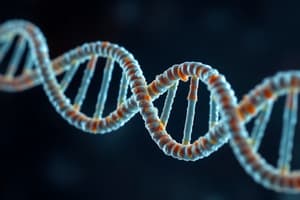Podcast
Questions and Answers
Write out the full name of DNA.
Write out the full name of DNA.
Deoxyribonucleic Acid
What is a gene?
What is a gene?
A segment of DNA that codes for a trait
Where in the cell are chromosomes located?
Where in the cell are chromosomes located?
Nucleus of the cell
DNA can be found in what two organelles?
DNA can be found in what two organelles?
What two scientists established the structure of DNA?
What two scientists established the structure of DNA?
What is the shape of DNA?
What is the shape of DNA?
What are the sides of the DNA ladder made of?
What are the sides of the DNA ladder made of?
What are the rungs of the DNA ladder made of?
What are the rungs of the DNA ladder made of?
What sugar is found in DNA?
What sugar is found in DNA?
What sugar is found in RNA?
What sugar is found in RNA?
The two purines in DNA are?
The two purines in DNA are?
How do the bases bond together?
How do the bases bond together?
DNA is made of repeating units called?
DNA is made of repeating units called?
Why is RNA necessary to act as a messenger?
Why is RNA necessary to act as a messenger?
Why can't the code be taken directly from the DNA?
Why can't the code be taken directly from the DNA?
Proteins are made where in the cell?
Proteins are made where in the cell?
How do some cells become brain cells and others become skin cells?
How do some cells become brain cells and others become skin cells?
Why is DNA called the Blueprint of Life?
Why is DNA called the Blueprint of Life?
Flashcards are hidden until you start studying
Study Notes
DNA Overview
- Full name of DNA is Deoxyribonucleic Acid.
- DNA consists of segments called genes, which code for specific traits.
DNA Structure and Location
- Chromosomes, which contain DNA, are located in the nucleus of the cell.
- DNA is found in chloroplasts and mitochondria, indicating its role in energy and photosynthesis.
Discovery and Shape
- The DNA structure was established by scientists James Watson and Frances Crick.
- DNA has a double helix shape, resembling a spiral ladder.
DNA Ladder Components
- The sides of the DNA ladder are composed of alternating sugar (deoxyribose) and phosphate molecules.
- The rungs of the DNA ladder consist of nitrogenous bases: thymine, adenine, guanine, and cytosine.
Sugar in DNA and RNA
- The sugar found in DNA is deoxyribose, while ribose is the sugar found in RNA.
DNA Bases and Bonding
- The two purines in DNA are adenine and guanine.
- Base pairing occurs as adenine bonds with thymine and guanine pairs with cytosine.
Fundamental Units
- DNA is made up of repeating structural units known as nucleotides.
RNA Functionality
- RNA serves as a messenger by transporting the genetic "message" from DNA to ribosomes, which are the sites of protein synthesis.
- RNA is preferred over direct DNA code transfer due to its speed.
Protein Synthesis
- Proteins are synthesized in the ribosome, which reads the RNA message to assemble amino acids into proteins.
Cell Specialization
- While all cells share the same DNA, differentiation into specific cell types (e.g., brain cells, skin cells) occurs due to the selective expression of genes.
DNA Significance
- DNA is referred to as the "Blueprint of Life" because it carries the complete genetic instructions needed for the development and functioning of all living organisms.
Studying That Suits You
Use AI to generate personalized quizzes and flashcards to suit your learning preferences.




